河南省禹州市一高2014-2015学年高一下学期第一次段考英语试题 Word版含答案
高一英语-2014-2015学年高一下学期第一次调研英语试题

2014—2015学年高一下学期第一次调研英语试卷(用时:100分钟)一:单项选择(共15 小题;每小题1分,满分15分)请认真阅读下面各题,从题中所给的A、B、C、D四个选项中,选出可以填入空白处的最佳选项,并在答题卡上将该项涂黑。
1. Everyone knows that ______ paper was invented by _______ Chinese.A. /; theB. the; aC. a; /D. a; a2. The town _______ I visited last year is named Saffron Walden.A. thatB. whereC. whoseD. what3. Can you show me the house _______ you were born?A. whichB. whereC. whenD. in where4. We like Jack because he is a man _______ everybody thinks is pleasant toA. who; talkB. whom; get along withC. who; get along withD. whom; talk with5. Is this the park _______ you visited when you came home last year?A. whereB. whichC. thatD. the one6. I don’t like the way ______ you speak to her.A. whichB. whereC. /D. what7._________ it is to fly kites on a windy day!A. How funB. What funC. How a funD. What a fun8.The exciting day all the American basketball fans looked forward to ____ at last.A. comingB. cameC. comeD. be coming9. He is the only one of the students _______ ever been to the USA.A. whom hasB. who hasC. who haveD. whom have10. Whether the wounded ________ sent to the hospital _______ unknown.A. has been; areB. have been; areC. were; areD. have been; is11. Please ________ me _______ the appointment with Mr White tomorrow.A. remind; withB. remind; ofC. talk; ofD. speak about12. __________ at the airport, the suspect (嫌疑犯) got arrested (被捕).A. When arrivedB. Upon arrivingC. Upon he arriveD. As soon as arrived13. The boss _____ company I worked in two years ago has _______ in solving such kind ofproblem.A. whose; many experiencesB. who; many experiencesC. whose; much experienceD. which; much experience14. Have you asked her for the reason _______ may explain her absence?A. whyB. thatC. because thatD. what15. The plant requires _________.A. wateringB. wateredC. to waterD. of water二:完形填空(共20小题;每小题1分,满分20分)请认真阅读下面短文,从短文后各题所给的A、B、C、D四个选项中,选出最佳选项,并在答题卡上将该项涂黑。
高中英语真题-2014—2015学年度下学期第一次调研考试

高中英语真题:2014—2015学年度下学期第一次调研考试(完卷时间:120分钟;满分:150分)第Ⅰ卷 (共89分)第一部分:听力(共20题;每小题1分, 满分20分)第一节(共5 小题;每小题1分, 满分5分)听下面5段对话。
每段对话后有一个小题, 从题中所给的A、B、C三个选项中选出最佳选项, 并标在试卷的相应位置。
听完每段对话后, 你都有10秒钟的时间来回答有关小题和阅读下一小题。
每段对话仅读一遍。
1. When did the woman get up this morning?A. At 7:00.B. At 7:30.C. At 8:30.2. What do we know about the woman?A. She is eager to see her sister.B. She has to leave without her sister.C. She will visit her sister in three months.3. What season is it now?A. Winter.B. Spring.C. Autumn.4. What color jeans does the man want?A. Blue.B. Black.C. Brown.5. What did the woman leave at the man’s flat?A. Her books.B. Her jacket.C. Her mobile phone.听第6段材料, 回答第6、7题。
6. How does the man suggest going to the show at first?A. By bus.B. By taxi.C. By subway.7. How much is a subway ticket?A. It is three times the price of taking a bus.B. It is half the price of taking a taxi.C. It is twice the price of taking a bus.听第7段对话, 回答第8、9题。
2014~2015学年度第一学期第一次段考高一英语试题及答案
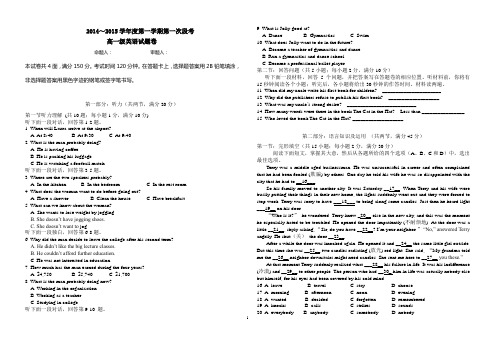
2014~2015学年度第一学期第一次段考高一级英语试题卷命题人:审题人:本试卷共4面,满分150分。
考试时间120分钟。
在答题卡上,选择题答案用2B铅笔填涂,非选择题答案用黑色字迹的钢笔或签字笔书写。
第一部分:听力(共两节,满分20分)第一节听力理解(共10题;每小题1分,满分10分)听下面一段对话,回答第1-2题。
1. When will Laura arrive at the airport?A. At 8:40.B. At 9:30.C. At 9:40.2. What is the man probably doing?A. He is having coffee.B. He is packing his luggage.C. He is watching a football match.听下面一段对话,回答第3-5题。
3. Where are the two speakers probably?A. In the kitchen.B. In the bedroom.C. In the rest room.4. What does the woman want to do before going out?A. Have a shower.B. Clean the house.C. Have breakfast.5. What can we know about the woman?A. She wants to lose weight by jogging.B. She doesn’t have jogging shoes.C. She doesn’t want to jog.听下面一段独白,回答第6-8题。
6. Why did the man decide to leave the college after his second term?A. He didn’t like the big lecture classes.B. He couldn’t afford further education.C. He was not interested in education.7. How much has the man earned during the four years?A. $4,750.B. $5,740.C. $1,700.8. What is the man probably doing now?A. Working in the organization.B. Working as a teacher.C. Studying in college.听下面一段对话,回答第9-10 题。
2014高一段考英语试卷

2014 – 2015 学年度高一英语段考试题本试卷分第Ⅰ卷(选择题)和第Ⅱ卷(非选择题)。
满分:150分,时间:120分钟第Ⅰ卷(选择题,共100分)第一部分:听力(共两节,满分30分)第一节(共5小题;每小题1.5分,满分7.5分)听下面5段对话,每段对话后有一个小题,从题中所给的A、B、C三个选项中选出最佳选项,并标在试卷的相应位置。
听完每段对话后,你都有10秒钟的时间来回答有关小题和阅读下一小题。
每段对话仅读一遍。
1.What might the weather be like this weekend?A. Sunny.B. Snowy.C. Rainy.2. What was the woman excited about?A. Seeing the scenery(风景).B. Going shopping.C. Going to the concert.3. Where does the conversation take place?A. In an office.B. In a taxi.C. At the woman’s.4. How long will it take the woman to get there?A. More than an hour.B. Less than an hour.C. An hour.5. What does the woman advise the man to do?A. Go to sleep.B. Finish the task early.C. Play the golf(高尔夫球). 第二节(共15小题;每小题1.5分,满分22.5分)听下面5段对话或独白。
每段对话或独白后有几个小题,从题中所给的A、B、C三个选项中选出最佳选项,并标在试卷的相应位置。
听每段对话或独白前,你将有时间阅读各小题,每小题5秒钟;听完后,各小题将给出5秒钟的作答时间。
2015高一下第一次段考答案

2015学年度下学期第一次段考高一级英语试题参考答案第一部分:听力(共两节,满分20分)第一节:听力理解(共6小题;每小题2分,满分12分)1-6 BABCCB第二节:回答问题(共4小题;每小题2分,满分8分)7. (On) March 23. 8. The lake.9. A double room (with a bath). 10. $ 240. / 240 dollars.第二部分:阅读(共两节,满分40分)第一节:阅读理解(共15小题;每小题2分,满分30分)11-13 CBC 14-17 ADCA 18-21 DABD 22-25 ADDB第二节:选句填空(共5小题;每小题2分,满分10分)26-30 BFGDE第三部分:语言知识及应用(共两节,满分45分)第一节:完形填空(共20小题;每小题1.5分,满分30分)31-35 BCACB36-40 CDBDC41-45 ACBAB46-50 CABDA第二节:语法填空(共10小题;每小题1.5分,满分15分)51. in 52. an 53. and 54. Suffering 55. who/that56. healthily 57. them 58. to learn 59. is connected 60.social第四部分: 词汇与句子结构(共三节满分45分)第一节:单词拼写(共10小题;每小题1.5分,满分15分)61. abstract 62. transform 63. effect 64. unique 65. permission66. folded 67. impressed 68. skipped 69. treasures 70. elegantly第二节:句型结构(共5小题;每空2分,满分10分)71. Dressed in 72. sounds as if/though 73. was deep in thought74. leave the guests waiting 75. in other words第三节:写作(共1小题;满分20分)I Like ReadingReading is my favourite hobby. I can never stop the love for reading because books are like wise teachers as well as good friends in my life. As we know, books are the source of knowledge. I benefit a great deal from reading.There are a variety of books for us to choose from, like history books, science books, literary books and so on. But what interests me most is literary books, especially those by famous writers. For one thing, they help to improve my writing skills and broaden my horizons. For another, they ca n enrich my life and provide me with great fun. Isn’t it a pleasure to have great calm in mind while you are reading?听力原文(Text 1)W:So, what are we going to do tonight, Dave?M:Let’s watch TV. There is a soccer match on between the US and Brazil.W:No way! We are on vacation. I refuse to sit in a hotel room and watch soccer on TV. I want to go to see a play. Then we maybe can have a coffee in the pub.M:Come on. I am sure it’s too late to get tickets now.W:But you won’t know for sure without trying.M:All right, all right. Which shows are popular right now?W:I read in New York Magazine yesterday that Jessica Lange and Alec Baldwin are co-starring in A Streetcar Named Desire. Isn’t that great? Let me first call the ticket agent to see if there are any tickets.(Text 2)W:Taxi! Oh, thank you for pulling up!M: You are welcome. Where to go, ma’am?W: Battery Park, please—but can you make a stop at Union Square? I want to pick up my friend there.M: Of course. They’re in the same direction and are quite ne ar each other.W: Good. How long will it take to get to Union Square?M: Well, that depends on the traffic, you know. It’s pretty heavy this afternoon.W: Can you make it in fifteen minutes? I am already ten minutes late.M: Ok, I will try. Where exactly is your friend waiting?W: On the side of 14th Street. Oh, we are already at 16th Street. You are fast. Can you make a left turn at the next corner?M: Ok, you got it.W: I think she is around here. Can you slow down? An, there she is! Do you see the woman in pink overcoat? Just in front of the bookshop. Sally!(Text 3)M: Excuse me. Could you help me?W: Yes. What seems to be the problem?M: Well, I was wondering if anyone has turned in a passport.W: I am afraid not. Have you lost your passport?M: I think so. I can't find it anywhere in my hotel room, and I remember the last place I used it yesterday was in this department store.W: Where exactly did you use your passport in our store?M: I wanted to buy a pair of sunglasses first, though I couldn't find a suitable pair. Then in the sports department I had to show it when I paid for a pair of training shoes with my traveler’s checks.W: Well, would you please fill in this lost property report? I will keep an eye out for it. Those kinds of things usually turn up eventually, but I suggest you contact your embassy and tell them about your situation, so they can issue you a new passport in case it doesn’t show up.M: OK. Do you have a pen?W: Here you are. And here is a piece of paper.M: Thank you. Oh. I always take good care of my things. I don't know what happened to me yesterday.Maybe I was too tired after that one hour swimming in the sea.(Text 4)M: Good afternoon, San Felice Hotel. May I help you?W: Yes. I’d like to book a room, please.M: Certainly. When for, madam?W: March the 23rd.M: How long will you be staying?W: Three nights.M: What kind of room would you like, single or double, madam?W: Uh…double. I’d appreciate it if you could give me a room with a view over the lake.M: Certainly, madam. I will just check what we have available…Yes, we have a double room with a bath on the 4th floor with a splendid view.W: Fine. How much is the room per night?M: Eighty dollars per night.W: That’s fine.M: Okay, let me give you your confirmation number. It’s 7576385. Thank you for choosing San Felice Hotel and have a nice day. Goodbye.W: Goodbye.Questions:7. When will the woman get to San Felice Hotel.8. What sights does the woman hope to see?9. What kind of room does the woman get at last?10. How much will the woman pay for her staying?。
高中英语真题-2014-2015学年高一下学期第一次月考英语试题
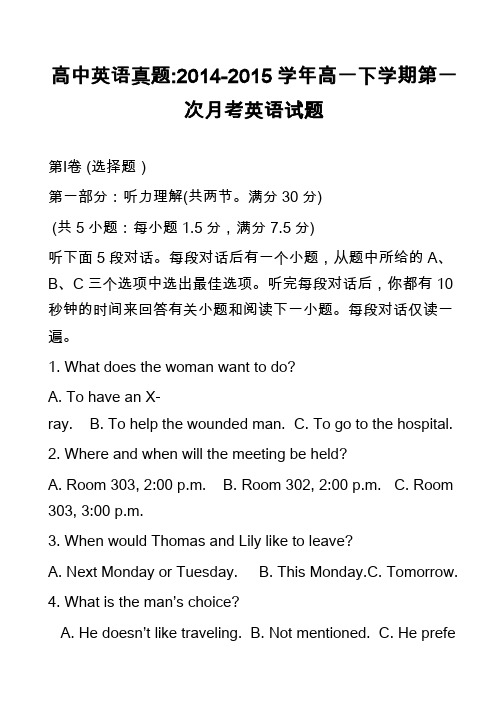
高中英语真题:2014-2015学年高一下学期第一次月考英语试题第Ⅰ卷 (选择题)第一部分:听力理解(共两节。
满分30分)(共5小题:每小题1.5分,满分7.5分)听下面5段对话。
每段对话后有一个小题,从题中所给的A、B、C三个选项中选出最佳选项。
听完每段对话后,你都有10秒钟的时间来回答有关小题和阅读下一小题。
每段对话仅读一遍。
1. What does the woman want to do?A. To have an X-ray. B. To help the wounded man. C. To go to the hospital.2. Where and when will the meeting be held?A. Room 303, 2:00 p.m.B. Room 302, 2:00 p.m.C. Room 303, 3:00 p.m.3. When would Thomas and Lily like to leave?A. Next Monday or Tuesday.B. This Monday.C. Tomorrow.4. What is the man’s choice?A. He doesn’t like traveling.B. Not mentioned.C. He prefers trains for trip.5. According to the man, what should the woman do at first?A. She should read the advertisements for flats in the newspa per.B. She should phone and make an appointment.C. She should ask about the flat on the phone.第二节(共15小题;每小题1.5分,共22.5分)听下面5段对话或独白。
高中英语真题-校2014-2015学年高一英语下学期第一次月考试题
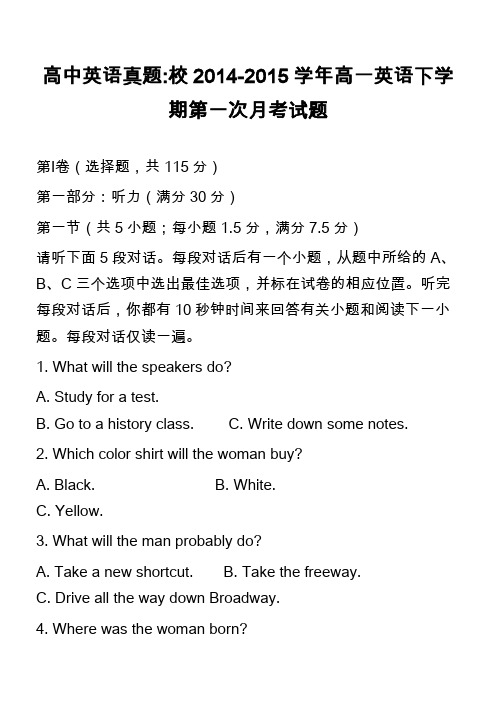
高中英语真题:校2014-2015学年高一英语下学期第一次月考试题第Ⅰ卷(选择题,共115分)第一部分:听力(满分30分)第一节(共5小题;每小题1.5分,满分7.5分)请听下面5段对话。
每段对话后有一个小题,从题中所给的A、B、C三个选项中选出最佳选项,并标在试卷的相应位置。
听完每段对话后,你都有10秒钟时间来回答有关小题和阅读下一小题。
每段对话仅读一遍。
1. What will the speakers do?A. Study for a test.B. Go to a history class.C. Write down some notes.2. Which color shirt will the woman buy?A. Black.B. White.C. Yellow.3. What will the man probably do?A. Take a new shortcut.B. Take the freeway.C. Drive all the way down Broadway.4. Where was the woman born?A. In .B. In .C. In .5. How do the speakers probably feel now?A. Mad and angry.B. Happy and proud.C. Confused and tired.第二节(共15小题;每小题1.5分,满分22.5分)听下面5段对话或独白。
每段对话或独白后有几个小题,从题中所给的A、B、C三个选项中选出最佳选项,并标在试卷的相应位置。
听每段对话或独白前,你将有时间阅读各个小题,每小题5秒钟;听完后,各小题将给出5秒钟的作答时间。
每段对话或独白读两遍。
听第6段材料,回答第6至8题。
6. Where are the speakers?A. At a party.B. In a gym.C. In the woman’s house.7. Why won’t the woman have more dessert?A. She wants to lose weight.B. She doesn’t like the dessert.C. She had a late lunch.8. What will the woman do tomorrow?A. Get up early for school.B. Go mountain climbing.C. Go out with the man.听第7段材料,回答第9至10题。
高中英语真题-学2014-2015学年高一英语下学期开学考试试题
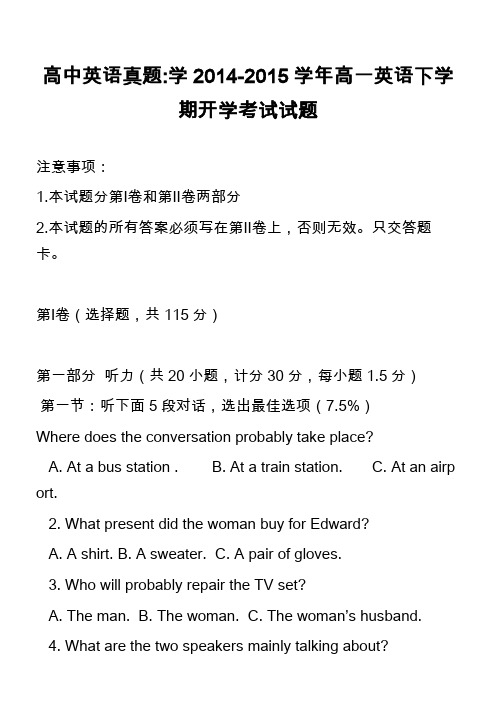
高中英语真题:学2014-2015学年高一英语下学期开学考试试题注意事项:1.本试题分第Ⅰ卷和第Ⅱ卷两部分2.本试题的所有答案必须写在第Ⅱ卷上,否则无效。
只交答题卡。
第Ⅰ卷(选择题,共115分)第一部分听力(共20小题,计分30分,每小题1.5分)第一节:听下面5段对话,选出最佳选项(7.5%)Where does the conversation probably take place?A. At a bus station .B. At a train station.C. At an airp ort.2. What present did the woman buy for Edward?A. A shirt.B. A sweater.C. A pair of gloves.3. Who will probably repair the TV set?A. The man.B. The woman.C. The woman’s husband.4. What are the two speakers mainly talking about?A. The man’s job interview.B. The man’s new boss.C. The woman’s good behavior5. How much does the man need to pay for two bottles of ora nge juice?A. Three dollars.B. Four dollars.C. Six dollars. 第二节:请听下面5段对话,选出最佳选项(22.5%)请听第6段材料,回答第6至7题。
6. How is the woman going to ?A . By plane. B. By train. C. By car.7. What will the woman do on Tuesday afternoon?A. Pick up Mr.BlackB. Meet a customerC. Attend a confere nce请听第7段材料,回答第8至9题。
高中英语真题-2014-2015学年第二学期高一年级
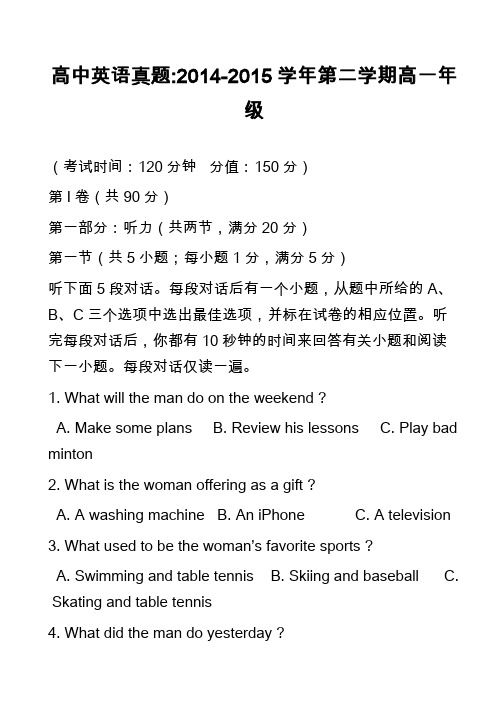
高中英语真题:2014-2015学年第二学期高一年级(考试时间:120分钟分值:150分)第I卷(共90分)第一部分:听力(共两节,满分20分)第一节(共5小题;每小题1分,满分5分)听下面5段对话。
每段对话后有一个小题,从题中所给的A、B、C三个选项中选出最佳选项,并标在试卷的相应位置。
听完每段对话后,你都有10秒钟的时间来回答有关小题和阅读下一小题。
每段对话仅读一遍。
1. What will the man do on the weekend ?A. Make some plansB. Review his lessonsC. Play bad minton2. What is the woman offering as a gift ?A. A washing machineB. An iPhoneC. A television3. What used to be the woman’s favorite sports ?A. Swimming and table tennisB. Skiing and baseballC. Skating and table tennis4. What did the man do yesterday ?A. He picked up his sisterB. He listened to a lectureC. He went to the hospital5. What’s the probable relationship between the speaker ?A. Mother and sonB. Husband and wifeC. Teac her and student第二节(共15小题:每小题1分,满分15分)听第6段材料,回答第6、7题。
6. Where is the man going ?A. A supermarketB. A bookstoreC. A flower shop7. How does the woman suggest the man get there ?A. By taxiB. By busC. On foot听第7段材料,回答第8、9题。
高中英语真题-2014-2015学年第一学期第一次学段考试
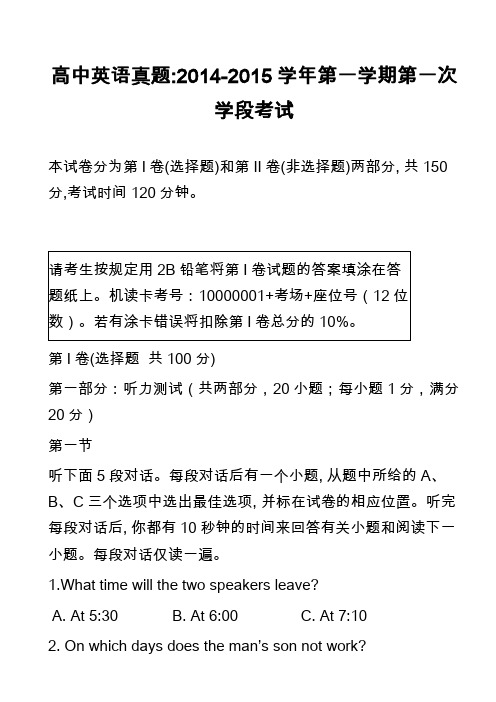
高中英语真题:2014-2015学年第一学期第一次学段考试本试卷分为第I卷(选择题)和第II卷(非选择题)两部分, 共150分,考试时间120分钟。
第I卷(选择题共100分)第一部分:听力测试(共两部分,20小题;每小题1分,满分20分)第一节听下面5段对话。
每段对话后有一个小题, 从题中所给的A、B、C三个选项中选出最佳选项, 并标在试卷的相应位置。
听完每段对话后, 你都有10秒钟的时间来回答有关小题和阅读下一小题。
每段对话仅读一遍。
1.What time will the two speakers leave?A. At 5:30B. At 6:00C. At 7:102. On which days does the man’s son not work?A. Monday, Wednesday and FridayB. Tuesday, Thursda y and SundayC. Monday, Friday and Saturday3. Where is the man’s new home?A. Near an airport.B. Near a train stationC. In the cen ter of the city4. What does the woman want the man to do?A. To work and playB. To play all the timeC. To work all the time5. What does the man mean?A. He doesn’t want to work tomorrow night.B. He can’t find the way out of the student center.C. He’s afraid the work will be really hard.第二节听下面5段对话或独白。
高中英语真题-2014-2015学年高一下学期第一次质量检测英语试题
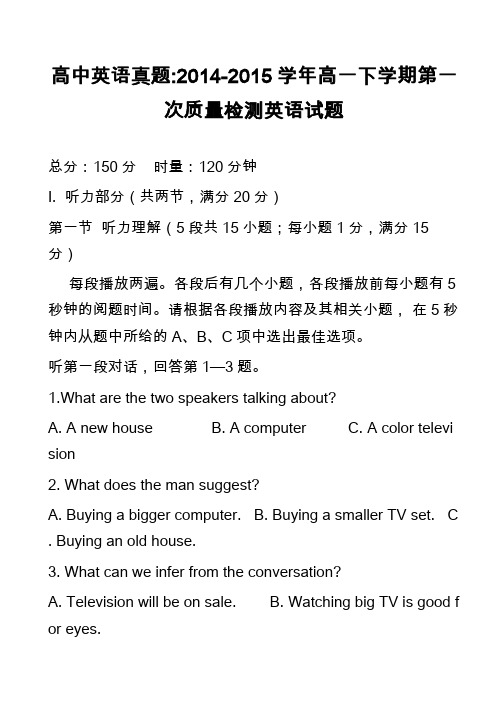
高中英语真题:2014-2015学年高一下学期第一次质量检测英语试题总分:150分时量:120分钟I. 听力部分(共两节,满分20分)第一节听力理解(5段共15小题;每小题1分,满分15分)每段播放两遍。
各段后有几个小题,各段播放前每小题有5秒钟的阅题时间。
请根据各段播放内容及其相关小题,在5秒钟内从题中所给的A、B、C项中选出最佳选项。
听第一段对话,回答第1—3题。
1.What are the two speakers talking about?A. A new houseB. A computerC. A color televi sion2. What does the man suggest?A. Buying a bigger computer.B. Buying a smaller TV set. C . Buying an old house.3. What can we infer from the conversation?A. Television will be on sale.B. Watching big TV is good f or eyes.C. The woman thinks a big television is much better.听第二段对话,回答第4—6题。
4. Where did the man get to know the woman?A. At the woman’s birthday party.B. At the man’s birthday p arty.C. At Andrew’s party.5. Where did the man invite the woman to go?A. To a concert.B. To his flat.C. To a party.6. What’s the time they fixed?A. This evening.B. This Friday.C. This Saturday .听第三段对话,回答第7—9题。
高一下第一次段考英语 试题2014 4月份
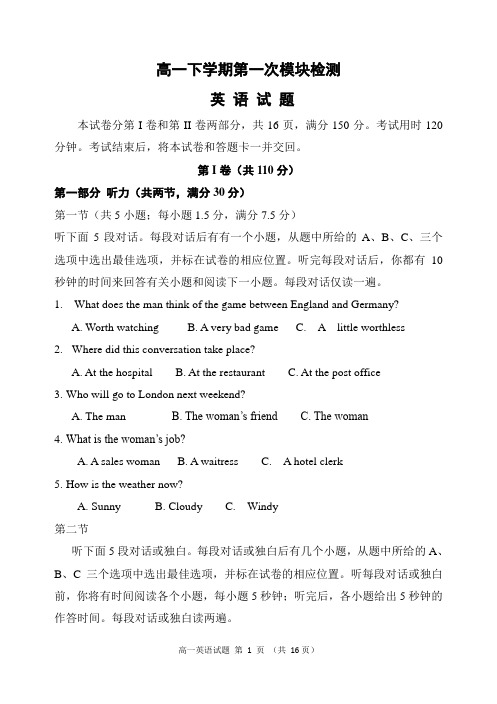
高一下学期第一次模块检测英语试题本试卷分第I卷和第II卷两部分,共16页,满分150分。
考试用时120分钟。
考试结束后,将本试卷和答题卡一并交回。
第I卷(共110分)第一部分听力(共两节,满分30分)第一节(共5小题;每小题1.5分,满分7.5分)听下面5段对话。
每段对话后有有一个小题,从题中所给的A、B、C、三个选项中选出最佳选项,并标在试卷的相应位置。
听完每段对话后,你都有10秒钟的时间来回答有关小题和阅读下一小题。
每段对话仅读一遍。
1. What does the man think of the game between England and Germany?A. Worth watchingB. A very bad gameC. A little worthless2.Where did this conversation take place?A. At the hospitalB. At the restaurantC. At the post office3.Who will go to London next weekend?A. The manB. The woman’s friendC. The woman4.What is the woman’s job?A. A sales womanB. A waitressC. A hotel clerk5.How is the weather now?A. SunnyB. CloudyC. Windy第二节听下面5段对话或独白。
每段对话或独白后有几个小题,从题中所给的A、B、C三个选项中选出最佳选项,并标在试卷的相应位置。
听每段对话或独白前,你将有时间阅读各个小题,每小题5秒钟;听完后,各小题给出5秒钟的作答时间。
每段对话或独白读两遍。
听第6段材料,回答第6至8题。
6.What is the man reading?A. A magazineB. A Chinese playC. A newspaper7. Where are the speakers going at the weekend?A. Beijing TheaterB. Beihai parkC. Beihai Cinema8.What are the speakers going there for ?A. For a visitB. To see Beijing OperaC. To learn Beijing Opera 听第7段材料,回答第9至11题。
河南省许昌县第一高级中学高一下学期第一次月考英语试卷
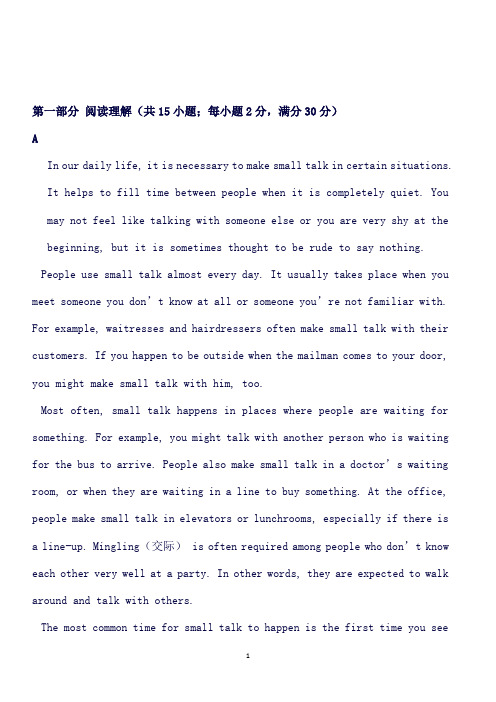
第一部分阅读理解(共15小题;每小题2分,满分30分)AIn our daily life, it is necessary to make small talk in certain situations.It helps to fill time between people when it is completely quiet. You may not feel like talking with someone else or you are very shy at the beginning, but it is sometimes thought to be rude to say nothing. People use small talk almost every day. It usually takes place when you meet someone you don’t know at all or someone you’re not familiar with. For example, waitresses and hairdressers often make small talk with their customers. If you happen to be outside when the mailman comes to your door, you might make small talk with him, too.Most often, small talk happens in places where people are waiting for something. For example, you might talk with another person who is waiting for the bus to arrive. People also make small talk in a doctor’s waiting room, or when they are waiting in a line to buy something. At the office, people make small talk in elevators or lunchrooms, especially if there is a line-up. Mingling(交际)is often required among people who don’t know each other very well at a party. In other words, they are expected to walk around and talk with others.The most common time for small talk to happen is the first time you seeor meet someone on a given day. For example, if you see a co-worker in the lounge (休息室) you might say hello and discuss the sports or weather. However, the next time you see each other you might just smile and say nothing. If there is very little noise, it might be the right time to start a pleasant conversation. If someone is reading a book at the bus stop, it is probably not a good idea to start a conversation. Another good time to make small talk is during a break in a meeting when there is nothing important going on. However, it is important to recognize the signal when the other person wants the conversation to stop.1.Small talk happens most probably except when _____.A. you’re having your hair cutB. you’re having a meetingC. you’re waiting for a busD. you’re waiting in a line to buy something2.It is the right time to make small talk whenA. there is nothing important going on during a break in a meetingB. the other person doesn’t want to start a conversationC. On the same day, you see a co-worker in the lounge againD. someone is reading a book at the bus stop3.The author develops the last paragraph mainly by _____.A. giving explanationsB. discussing questionsC. telling storiesD. providing examples4.We can learn from the text that small talk _____.A. won’t happen among strangersB. can help to break the silenceC. is often thought to be unnecessaryD. always makes people uncomfortable【答案】1.B2.A3.D4.B考点:生活类阅读。
禹州市一高2014-2015学年(下)第一次段考 高一英语试题
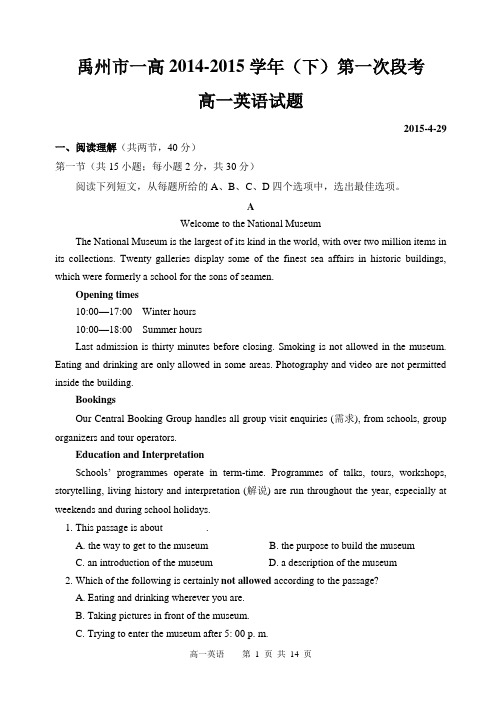
禹州市一高2014-2015学年(下)第一次段考高一英语试题2015-4-29 一、阅读理解(共两节,40分)第一节(共15小题;每小题2分,共30分)阅读下列短文,从每题所给的A、B、C、D四个选项中,选出最佳选项。
AWelcome to the National MuseumThe National Museum is the largest of its kind in the world, with over two million items in its collections. Twenty galleries display some of the finest sea affairs in historic buildings, which were formerly a school for the sons of seamen.Opening times10:00—17:00 Winter hours10:00—18:00 Summer hoursLast admission is thirty minutes before closing. Smoking is not allowed in the museum. Eating and drinking are only allowed in some areas. Photography and video are not permitted inside the building.BookingsOur Central Booking Group handles all group visit enquiries (需求), from schools, group organizers and tour operators.Education and InterpretationSchools’ programmes operate in term-time. Programmes of talks, tours, workshops, storytelling, living history and interpretation (解说) are run throughout the year, especially at weekends and during school holidays.1. This passage is about ________.A. the way to get to the museumB. the purpose to build the museumC. an introduction of the museumD. a description of the museum2. Which of the following is certainly not allowed according to the passage?A. Eating and drinking wherever you are.B. Taking pictures in front of the museum.C. Trying to enter the museum after 5: 00 p. m.D. Smoking in or out of the museum.3. From the passage we know ________.A. the museum runs a school and has students of its ownB. students can receive different kinds of education hereC. part of school education has to be done in the museumD. school programmes are only run at weekends and on holidaysBMost people go to a doctor in their own town or suburb (郊区). But people in the Australian outback can’t get to a doctor quickly. The nearest doctor is sometimes hundreds of kilometers away so they have to call him on a two-way radio. This special doctor is called the “flying doctor”. He visits sick people by plane.When someone is very sick, the doctor has to fly to the person’s home. His plane lands on a flat piece of ground near the person’s house. Sometimes the doctor has to take the patient to hospital. Flying doctors take about 8,600 people to hospital each year.However, most of the time the person isn’t very sick, and the doctor doesn’t have to visit. He can give advice on the radio from the office at the flying doctor center. He can tell the patient to use some medicine from a special medicine chest (箱子). There is one of these chests in every home in the outback. Each bottle, tube (管子)and packet (包)in the chest has a number. The doctor often says something like this, “take two tablets (药片)from bottle 5 every four hours.”4. Some people in the Australian outback can’t get to a doctor quickly b ecause_________A.there are few doctors thereB.the nearest doctor is sometimes very far away from themC.there is always heavy traffic on the roadD.they don’t want to see a doctor5. The word “outback” in the passage probably means__________.A.the part of a country far away from citiesB. downtownB.forest D. market-place6. If the person isn’t very sick, the doctor only _________.A. tells him to have a restB. tells him what food to eatC. gives him some adviceD. gives him some medicine7. From the passage we know that_________.A.people in Australia are seldom illB.a “flying doctor” is a man who flies people to hospitalC.there are very few hospitals in AustraliaD.every family in the outback has a special medicine chestCWe are all called upon to make a speech at some point in life, but most of us don’t do a very good job. This article gives some suggestions on how to give an effective speech.So, you have to give a speech—and you’re terrified. You get nervous, you forget what you want to say, you stumble(结巴) over words, you talk too long, and you bore your audience. Later you think, “Thank goodness, it’s over. I’m just no good at public speaking. I hope I never h ave to do that again.”Cheer up! It doesn’t have to be that bad. Here are some simple steps to take the pain out of speech making. Ask yourself the purpose of your speech. What is the occasion? Why are you speaking? Then, gather as many facts as you can on your subject. Spend plenty of time doing your research. Then spend plenty of time organizing your material so that your speech is clear and easy to follow. Use as many examples as possible, and use pictures, charts, and graphs if they will help you make y our points more clearly. Never forget your audience. Don’t talk over their heads, and don’t talk down to them. Treat your audience with respect. They will appreciate your thoughtfulness.Just remember: be prepared. Know your subject, your audience, and the occasion. Be brief. Say what you have to say and then stop. And be yourself. Let your personality come through so that you make person-to-person contact with your audience.If you follow these simple steps, you’ll see that you don’t have to be afraid of p ublic speaking. In fact, you may find the experience so enjoyable that you volunteer to make more speeches! You’re not convinced yet? Give it a try and see what happens.8. The main idea of this article is that ________.A. you can improve your speaking abilityB. a poor speaker can never changeC. one should make a short speechD. it is hard to make a speech9. Paragraph 2 implies that ________.A. many people talk too longB. many people are happy to give a speechC. many people do not prepare for a speechD. many people are afraid of giving a speech10. The phrase “talk over their heads” means ________.A. speak too loudlyB. look at the ceilingC. use difficult wordsD. look down upon them11. The title for this passage may be ________.A. Try to Enjoy a SpeechB. How to Give a Good SpeechC. How to Prepare for a SpeechD. Do Not Make a Long SpeechDWhat will man be like in the future — in 5,000 or even 50,000 years from now? We can only make guesses, of course, but we can be sure that he will be different from what he is today, for man is slowly changing all the time.Let us take an obvious example. Man, even five hundred years ago, was shorter than he is today. Now, on average, men are about three inches taller. Five hundred years is relatively a short period of time, so we may suppose that man will continue to grow taller. Again, in the modern world we use our brains a great deal. Even so, we still make use of only about 20% of the brain’s capacity(容量). As time goes on, however, we shall have to use our brains more and more, and finally we shall need our brains more and more, and finally we shall need larger ones! This is likely to bring a physical change too: the head, in particular the forehead, will grow larger.Nowadays our eyes are in constant use. In fact, we use them so much that very often they become weaker and we have to wear glasses. But over long period of time it is likely that man’s eyes will grow stronger.On the other hand, we tend to make less use of our arms and legs. These, as a result, are likely to grow weaker. At the same time, however, our fingers will grow more sensitive because they are used a great deal in modern life.But what about hair? This will probably disappear from the body altogether in course of time because it does not serve a useful purpose any longer. In the future, then, both sexes are likely to be bald.Perhaps all this gives the impression that future man will not be a very attractive creature to look at! This may well be true. All the same, in spite of all these changes, future man will still have a lot in common with us. He will still be a human being, with thoughts and emotions similar to our own.12. The passage mainly tells us that __________.A. Man’s life will be different in the futureB. Future man will look quite different from usC. Man is growing taller and uglier as time passesD. Man’s organs’ functions will change13. What serves as the evidence that man is changing?A. Man has got stronger eyes now than he ever had.B. Man’s hair is getting thinner and thinner.C. Man’s arms and legs have become lighter and weaker.D. Man has been growing taller over the past 500 years.14. The change in man’s size of the fore head is probably because __________.A. he makes use of only20% of the brain’s capacityB. his brain has grown larger over the past centuriesC. he will use his brain more and more as time goes onD. the other 80% of his brain will grow in due time15. Which of the following is TRUE about a human being in the future?A. He is hairless because hair is no longer useful.B. He has smaller eyes and wears better glasses.C. His fingers grow weaker because he doesn’t have to make use of them.D. He thinks and feels in a different way.第二节(共5小题;每小题2分,共10分)根据短文内容,从短文后的七个选项中选出能填入空白处的最佳选项。
高中英语真题-2014-2015学年高一英语1月份阶段测试试题
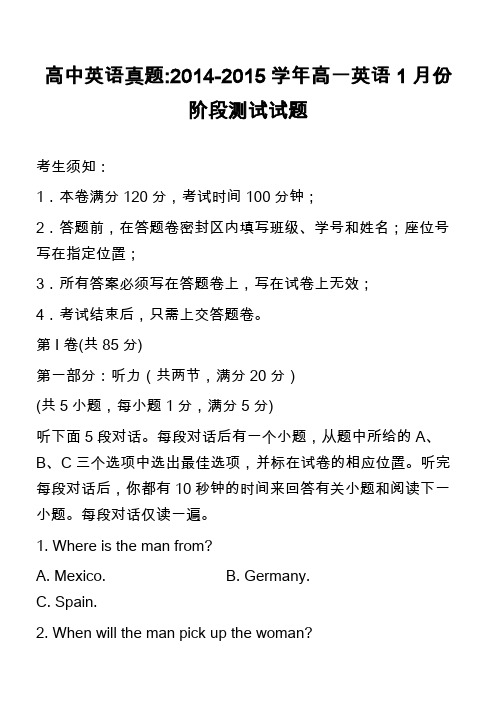
高中英语真题:2014-2015学年高一英语1月份阶段测试试题考生须知:1.本卷满分120分,考试时间100分钟;2.答题前,在答题卷密封区内填写班级、学号和姓名;座位号写在指定位置;3.所有答案必须写在答题卷上,写在试卷上无效;4.考试结束后,只需上交答题卷。
第 I 卷(共85分)第一部分:听力(共两节,满分20分)(共5小题,每小题1分,满分5分)听下面5段对话。
每段对话后有一个小题,从题中所给的A、B、C三个选项中选出最佳选项,并标在试卷的相应位置。
听完每段对话后,你都有10秒钟的时间来回答有关小题和阅读下一小题。
每段对话仅读一遍。
1. Where is the man from?A. Mexico.B. Germany.C. Spain.2. When will the man pick up the woman?A. At 7:20.B. At 7:40.C. At 8:00.3. What did the man do yesterday afternoon?A. He went out with Ken.B. He played baseball.C. He watched TV.4. How did the man get home?A. By bus.B. On foot.C. By taxi.5. What are the speakers mainly talking about?A. A sports meeting.B. The meeting.C.A notice.(共15小题,每小题1分,满分15分)听下面5段对话或独白。
每段对话后有几个小题,从题中所给的A、B、C三个选项中选出最佳选项,并标在试卷的相应位置。
听每段对话或独白前,你将有时间阅读各个小题,每小题5秒钟;听完后每小题将给出5秒钟的作答时间。
每段对话或独白读两遍。
听下面一段对话,回答第6和第7题。
6. What does the man want a shirt for?A. A party.B. A meeting.C. A job interview.7. What does the man dislike about the light blue shirt?A. The color.B. The price.C. The size.听下面一段对话,回答第8和第9题。
名师解析河南省豫西名校2014-2015学年下学期高一第一次联考英语试题 扫描版及word答案原创word版,含解析

高一英语答案听力1-5: CABBA 6-10: CBACB 11-15: CAABC 16-20: CABAC 阅读理解:ADDB CDC BCBD DDCB BFECA完形填空41-45 CDCAD 46-50 CBADB 51-55 DCCAB 56-60 CADAB语法填空61. from 62. when 63. my/the 64. on65. excitement66. greatest 67. have adopted 68. and 69. Hopefully 70. doing改错1.which改为what2.go改为goes3.wait后加for4.classmate改为classmates5.trying改为try 6 .calm改为calmly 7.a改为the 改为you 9. missed改为missing 10.telling改为tellDear Mr. Smith,I’m Li Hua, monitor of class one. I’m writing to invite you to take part in a camp organized by our school. Let me tell you the detailed information.On sunday, we will get together at our school gate at 8:00 am. And then we’ll take the school bus to Chongdu Valley. Please bring a tent, a pot, and some food. After putting up our tent, some students may go climbing while others may go canoeing. What’s more, those who would like to lookfor adventure may go further into the forest. The most unforgettable part may be taking turns to cook for others, which will surely add fun to our camping life. We’ll be back at 4:00 pm.Isn’t it exciting? Why not join us? I’m looking forward to your reply.Yours, Li Hua。
高中英语真题-2014—2015学年第二学期第一次月考英语试卷
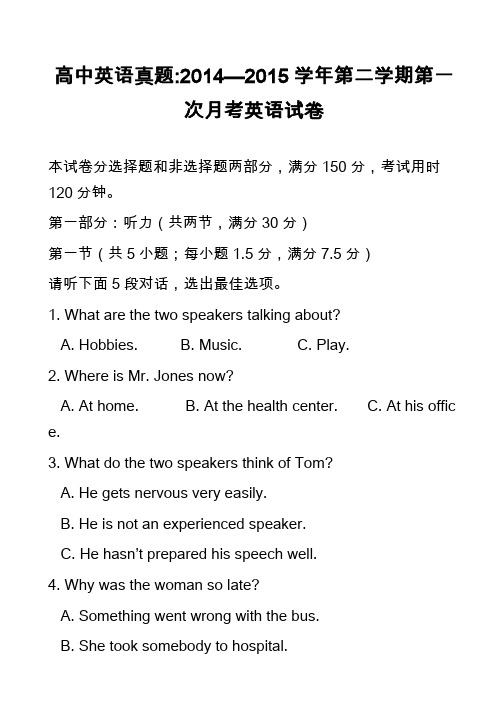
高中英语真题:2014—2015学年第二学期第一次月考英语试卷本试卷分选择题和非选择题两部分,满分150分,考试用时120分钟。
第一部分:听力(共两节,满分30分)第一节(共5小题;每小题1.5分,满分7.5分)请听下面5段对话,选出最佳选项。
1. What are the two speakers talking about?A. Hobbies.B. Music.C. Play.2. Where is Mr. Jones now?A. At home.B. At the health center.C. At his offic e.3. What do the two speakers think of Tom?A. He gets nervous very easily.B. He is not an experienced speaker.C. He hasn’t prepared his speech well.4. Why was the woman so late?A. Something went wrong with the bus.B. She took somebody to hospital.C. She didn’t catch the bus.5. What does the man mean?A. He enjoys most types of games.B. Basketball is his favorite sport.C. He only plays basketball.第二节(共15小题; 每小题1.5分,满分22.5分)请听下面5段对话或独白,选出最佳选项。
请听第6段材料,回答第6、7题。
6. What is the man doing?A. He is being interviewed.B. He is making a flash.C. He is playing computer games.7. What do you think will happen after the conversation?A. The woman will call Mr. Taylor.B. The woman won’t make the website.C. The woman won’t get in touch with Mr. Taylor.请听第7段材料,回答第8至10题。
河南省级示范性高中2014-2015学年高一下学期教学评价诊断测试英语试题 Word版缺答案

2014—2015学年下期高一年级教学评价诊断试题英语考生注意:1.本试卷分第Ⅰ卷(选择题)和第Ⅱ卷(非选择题)两部分。
满分150分,考试时间120分钟。
2.考生作答时,请将答案答在答题卡上。
第Ⅰ卷每小题选出答案后,用2B铅笔把答题卡上对应题目的答案标号涂黑;第Ⅱ卷请用直径0.5毫米黑色墨水签字笔在答题卡上各题的答题区域内作答,超出答题区域书写的答案无效,在试题卷、草稿纸上作答无效。
............................第Ⅰ卷第一部分听力(共两节,满分30分)第一节(共5小题;每小题1.5分,满分7.5分)1.What are the two speakers going to buy?A.Bread.B.Cheese. C.Eggs.2.How does the woman find the fish?A.Just so-so. B.Bad.C.Quite good.3.What does the woman mean?A.Mark should go on with the game.B.Mark should draw pictures on the computer.C.Mark should review his lessons.4.Where does the conversation take place?A.In the bookstore. B.In the library. C.In the classroom.5.Why doesn’t like chocolate cake?A.She doesn’t like chocolate. B.She has trouble with her tooth.C.She has no tooth.第二节:听力理解(共15小题;每小题1.5分,满分22.5分)请听第6段材料,回答第6-7题。
6.In which department can this conversation most probably take place?A.Shoe Department. B.Clothing Department. C.Jewelry Department. 7.What could be the reason if the woman does not buy the overcoat?A.The color. B.The size. C.The price.请听第7段材料,回答第8—10题8.What can the woman be?A.A waitress at a hotel B.The secretary of Mr. Black C.The assistant of Professor Green.9.How could the man get in touch with Mr. Green?A.Ask the woman to find the Blackwood Hotel. B.Dial 809.C.Dial 114 to find the telephone number of the Blackwood Hotel.10.Why did the man ask the woman to change the dollar?A.To pay for the information. B.To make a phone call.C.To go to the hotel by bus.请听第8段材料,回答第11—14题11.What is the man doing?A.Selling his house. B.Looking for a house. C.Looking for work.12.How long has the woman lived in the house?A.19 years. B.8 years. C.20 years.13.Why does the woman want to sell the house?A.She wants to move abroad. B.She wants to move to the countryside.C.She hopes to get a lot of money.14.How much does the house cost?A.$6,850. B.$6,815. C.$7,850请听第9段材料,回答第15—17题15.What’s the probable relationship between the two speakers?A.Friends. B.Strangers. C.Husband and wife 16.How did the woman find her stay there?A.Boring B.Wonderful C.Adventurous17.What does the man advise the woman to do when she gets home?A.Send him an email. B.Write a letter to him. C.Give him a call.请听第10段材料,回答第18—20题.18.How old was Rose when she left school?A.16. B.17. C.1819.What did Rose learn in the college?A.Computer. B.English. C.Typing.20.How much will the office pay Rose in three months if she gets the job?A.$30. B.$27. C.$20.第二部分阅读理解(共两节,满分40分)第一节(共15小题;每小题2分,满分30分)阅读下列短文,从每题所给的四个选项(A、B、C和D)中,选出最佳选项。
- 1、下载文档前请自行甄别文档内容的完整性,平台不提供额外的编辑、内容补充、找答案等附加服务。
- 2、"仅部分预览"的文档,不可在线预览部分如存在完整性等问题,可反馈申请退款(可完整预览的文档不适用该条件!)。
- 3、如文档侵犯您的权益,请联系客服反馈,我们会尽快为您处理(人工客服工作时间:9:00-18:30)。
禹州市一高2014-2015学年(下)第一次段考高一英语试题2015-4-29 一、阅读理解(共两节,40分)第一节(共15小题;每小题2分,共30分)阅读下列短文,从每题所给的A、B、C、D四个选项中,选出最佳选项。
AWelcome to the National MuseumThe National Museum is the largest of its kind in the world, with over two million items in its collections. Twenty galleries display some of the finest sea affairs in historic buildings, which were formerly a school for the sons of seamen.Opening times10:00—17:00 Winter hours10:00—18:00 Summer hoursLast admission is thirty minutes before closing. Smoking is not allowed in the museum. Eating and drinking are only allowed in some areas. Photography and video are not permitted inside the building.BookingsOur Central Booking Group handles all group visit enquiries (需求), from schools, group organizers and tour operators.Education and InterpretationSchools’ programmes operate in term-time. Programmes of talks, tours, workshops, storytelling, living history and interpretation (解说) are run throughout the year, especially at weekends and during school holidays.1. This passage is about ________.A. the way to get to the museumB. the purpose to build the museumC. an introduction of the museumD. a description of the museum2. Which of the following is certainly not allowed according to the passage?A. Eating and drinking wherever you are.B. Taking pictures in front of the museum.C. Trying to enter the museum after 5: 00 p. m.D. Smoking in or out of the museum.3. From the passage we know ________.A. the museum runs a school and has students of its ownB. students can receive different kinds of education hereC. part of school education has to be done in the museumD. school programmes are only run at weekends and on holidaysBMost people go to a doctor in their own town or suburb (郊区). But people in the Australian outback can’t get to a doctor quickly. The nearest doctor is sometimes hundreds of kilometers away so they have to call him on a two-way radio. This special doctor is called the “flying doctor”. He visits sick people by plane.When someone is very sick, the doctor has to fly to the person’s home. His plane lands on a flat piece of ground near the person’s house. Sometimes the doctor has to take the patient to hospital. Flying doctors take about 8,600 people to hospital each year.However, most of the time the person isn’t very sick, and the doctor doesn’t have to visit. He can give advice on the radio from the office at the flying doctor center. He can tell the patient to use some medicine from a special medicine chest (箱子). There is one of these chests in every home in the outback. Each bottle, tube (管子)and packet (包)in the chest has a number. The doctor often says something like this, “take two tablets (药片)from bottle 5 every four hours.”4. Some people in the Austra lian outback can’t get to a doctor quickly because_________A.there are few doctors thereB.the nearest doctor is sometimes very far away from themC.there is always heavy traffic on the roadD.they don’t want to see a doctor5. The word “outback” in the passage probably means__________.A.the part of a country far away from citiesB. downtownB.forest D. market-place6. If the person isn’t very sick, the doctor only _________.A. tells him to have a restB. tells him what food to eatC. gives him some adviceD. gives him some medicine7. From the passage we know that_________.A.people in Australia are seldom illB.a “flying doctor” is a man who flies people to hospitalC.there are very few hospitals in AustraliaD.every family in the outback has a special medicine chestCWe are all called upon to make a speech at some point in life, but most of us don’t do a very good job. This article gives some suggestions on how to give an effective speech.So, you have to give a speech—and you’re terrified. You get nervous, you forget what you want to say, you stumble(结巴) over words, you talk too long, and you bore your audience. Later you think, “Thank goodness, it’s over. I’m just no good at public speaking. I hope I never h ave to do that again.”Cheer up! It doesn’t have to be that bad. Here are some simple steps to take the pain out of speech making. Ask yourself the purpose of your speech. What is the occasion? Why are you speaking? Then, gather as many facts as you can on your subject. Spend plenty of time doing your research. Then spend plenty of time organizing your material so that your speech is clear and easy to follow. Use as many examples as possible, and use pictures, charts, and graphs if they will help you make y our points more clearly. Never forget your audience. Don’t talk over their heads, and don’t talk down to them. Treat your audience with respect. They will appreciate your thoughtfulness.Just remember: be prepared. Know your subject, your audience, and the occasion. Be brief. Say what you have to say and then stop. And be yourself. Let your personality come through so that you make person-to-person contact with your audience.If you follow these simple steps, you’ll see that you don’t have to be afraid of p ublic speaking. In fact, you may find the experience so enjoyable that you volunteer to make more speeches! You’re not convinced yet? Give it a try and see what happens.8. The main idea of this article is that ________.A. you can improve your speaking abilityB. a poor speaker can never changeC. one should make a short speechD. it is hard to make a speech9. Paragraph 2 implies that ________.A. many people talk too longB. many people are happy to give a speechC. many people do not prepare for a speechD. many people are afraid of giving a speech10. The phrase “talk over their heads” means ________.A. speak too loudlyB. look at the ceilingC. use difficult wordsD. look down upon them11. The title for this passage may be ________.A. Try to Enjoy a SpeechB. How to Give a Good SpeechC. How to Prepare for a SpeechD. Do Not Make a Long SpeechDWhat will man be like in the future — in 5,000 or even 50,000 years from now? We can only make guesses, of course, but we can be sure that he will be different from what he is today, for man is slowly changing all the time.Let us take an obvious example. Man, even five hundred years ago, was shorter than he is today. Now, on average, men are about three inches taller. Five hundred years is relatively a short period of time, so we may suppose that man will continue to grow taller. Again, in the modern world we use our brains a great deal. Even so, we still make use of only ab out 20% of the brain’s capacity(容量). As time goes on, however, we shall have to use our brains more and more, and finally we shall need our brains more and more, and finally we shall need larger ones! This is likely to bring a physical change too: the head, in particular the forehead, will grow larger.Nowadays our eyes are in constant use. In fact, we use them so much that very often they become weaker and we have to wear glasses. But over long period of time it is likely that man’s eyes will grow stronger.On the other hand, we tend to make less use of our arms and legs. These, as a result, are likely to grow weaker. At the same time, however, our fingers will grow more sensitive because they are used a great deal in modern life.But what about hair? This will probably disappear from the body altogether in course of time because it does not serve a useful purpose any longer. In the future, then, both sexes are likely to be bald.Perhaps all this gives the impression that future man will not be a very attractive creature to look at! This may well be true. All the same, in spite of all these changes, future man will still have a lot in common with us. He will still be a human being, with thoughts and emotions similar to our own.12. The passage mainly tells us that __________.A. Man’s life will be different in the futureB. Future man will look quite different from usC. Man is growing taller and uglier as time passesD. Man’s organs’ functions will change13. What serves as the evidence that man is changing?A. Man has got stronger eyes now than he ever had.B. Man’s hair is getting thinner and thinner.C. Man’s arms and legs have become lighter and weaker.D. Man has been growing taller over the past 500 years.14. The change in man’s size of the fore head is probably because __________.A. he makes use of only 20% of the brain’s capacityB. his brain has grown larger over the past centuriesC. he will use his brain more and more as time goes onD. the other 80% of his brain will grow in due time15. Which of the following is TRUE about a human being in the future?A. He is hairless because hair is no longer useful.B. He has smaller eyes and wears better glasses.C. His fingers grow weaker because he doesn’t have to make use of them.D. He thinks and feels in a different way.第二节(共5小题;每小题2分,共10分)根据短文内容,从短文后的七个选项中选出能填入空白处的最佳选项。
